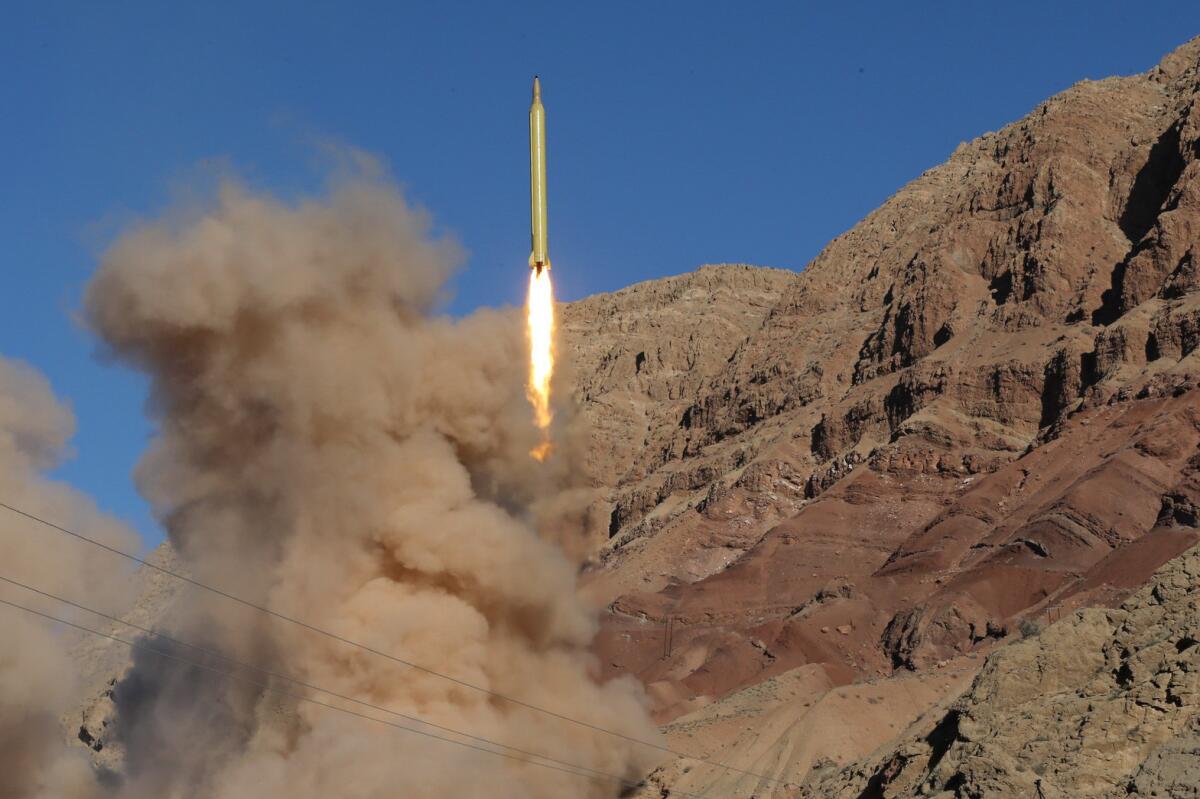Iran’s latest missile test launches do not violate nuclear deal, U.S. says

A long-range Qadr ballistic missile is launched in the Alborz mountain range in northern Iran on March 9.
- Share via
Reporting from Tehran — Iran test-launched a series of ballistic missiles Wednesday in an exercise that dramatized Tehran’s determination to bolster its arsenal in the aftermath of last year’s nuclear accord.
The Obama administration labeled the missile launches provocative, but said the firings did not violate the terms of last year’s nuclear deal between Iran and world powers, including the United States.
Iran regularly showcases its homegrown missile program as a proclaimed deterrent against attack by Israel, its longtime regional adversary.
The semiofficial Fars News Agency reported that one of a pair of Qadr H missiles — named after a Koranic verse — was inscribed with the phrase “Israel should be wiped off the Earth,” a stock slogan for years among hard-liners in Iran. The missiles were fired in the nation’s Alborz mountain range, the agency said.
Tests of various ballistic missiles were continuing this week, Iranian officials said.
There was no immediate comment on the tests from Israel, which was hosting Vice President Joe Biden on Wednesday.
Biden told reporters in Jerusalem that U.S. officials were closely watching Iran’s “conventional activity outside the [nuclear] deal.” He repeated U.S. vows to take action should Tehran be found to be violating the terms of the nuclear pact.
NEWSLETTER: Get the day’s top headlines from Times Editor Davan Maharaj >>
Under the landmark nuclear deal, Iran agreed to strict constraints on its atomic program in exchange for an end to nuclear-related sanctions that have throttled the nation’s economy.
The Obama administration will bring Iran’s latest reported test firings to the attention of the United Nations Security Council, John Kirby, a State Department spokesman, told reporters in Washington. A U.N. resolution calls on Iran to not develop or test missiles capable of delivering nuclear warheads.
“We’re not going to turn a blind eye to this and we’re not at all trying to make any excuses for it,” Kirby told reporters in Washington.
Iran maintains that missile development is within its rights to self-defense and faces no U.N. restrictions.
In January, Washington slapped fresh sanctions on Iran’s missile program after a series of Iranian test launches last fall. Iranian officials have mocked the U.S. actions as futile and belligerent.
“Our enemies have realized that broader sanctions and security pressures have had little impact on our capabilities,” Maj. Gen. Mohammad Ali Jafari, commander of the powerful Revolutionary Guard, told Fars. “That’s why they now seek to confine us in the missile field through economic sanctions.”
The high-profile tests, analysts said, have a dual purpose: to demonstrate Iran’s missile capabilities to outside adversaries — including Israel, Saudi Arabia and the United States — while reassuring a domestic constituency that the nation’s military might remains robust, despite the nuclear pact, at a moment of high regional tension.
“The ruling establishment is sending a message to the outside world that even though Iran has rejected nuclear weaponry, we are developing our missiles and making them increasingly sophisticated,” analyst Nader Karimi Juni said.
Iranian television showed video of a pair of the golden-hued Qadr H missiles kicking up dust after being launched from barren terrain described as the Alborz Mountains.
The missiles, Fars reported, have a range of 1,240 miles, more than sufficient to hit Israel, which is less than 1,000 miles from Iranian territory. Iran has previously touted the test-launching of various missile types capable of reaching Israel.
Join the conversation on Facebook >>
“I want to reiterate, which I know people doubt here, if in fact they break the deal we will act,” Biden said after a meeting with Israeli Prime Minister Benjamin Netanyahu, an outspoken opponent of the nuclear pact with Iran.
Iran says its nuclear program has always been solely for peaceful purposes, such as energy generation and development of isotopes for cancer treatment. Its ballistic missile arsenal was never designed to carry nuclear warheads, Iranian officials say.
In Israel, leaders say the nuclear deal and the rise of the government of Iranian President Hassan Rouhani — a moderate who championed the nuclear accord and an opening to the West — have not resulted in diminished tension with Iran. Tehran also supplies weapons technology to its Lebanese proxy, Hezbollah, which has thousands of rockets capable of hitting Israeli territory.
“To my regret there are some in the West who are misled by the honeyed words of part of the Iranian leadership while the other part continues to produce equipment and weaponry, to arm terrorist groups,” Israeli Defense Minister Moshe Yaalon told Israel Radio.
The United States and Israel consider Hezbollah, a dominant power in Lebanon, a terrorist organization. Hezbollah calls itself a “resistance” force against Israel and the United States.
Special correspondent Mostaghim reported from Tehran and Times staff writer McDonnell from Beirut. Special correspondent Kate Shuttleworth in Jerusalem contributed to this report.
Twitter: @mcdneville
ALSO:
Human rights groups criticize European Union-Turkish plan to stop Syrian migrants
U.S. tourist killed in knife attack in Israel, where survey illuminates deep divides
Donkeys and women have no place in Iran’s parliament, lawmaker says
More to Read
Sign up for Essential California
The most important California stories and recommendations in your inbox every morning.
You may occasionally receive promotional content from the Los Angeles Times.









